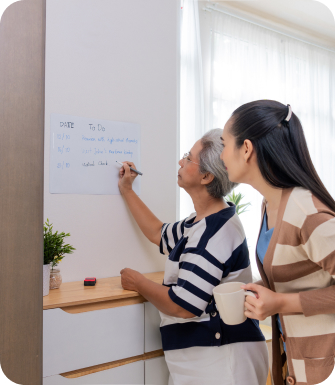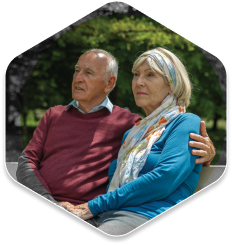
Accepting your
new normal
Living with cancer may come with changes to your everyday life, including some you may not have expected. Here are some tips to help you understand and manage your “new normal.”
What is my “new normal”?
You may find yourself facing new realities in your day-to-day life, including new ways of thinking, feeling, and living. You may not be able to do the same things you used to due to fatigue, health precautions, or surgery. As a result, your diet or exercise goals may have changed, and you might have picked up new hobbies and routines that are a better fit for you now. In spite of new challenges, some people living with cancer say the biggest change they experienced was gaining a new perspective and appreciation for life.
For many living with cancer, adjusting to these changes is not about “getting back to normal” so much as discovering what normal means for you now.
Below are some helpful ways to manage your new energy levels, lean on your support network for help, and set boundaries when needed.

How to manage energy levels
Fatigue is a common problem for people with cancer during treatment. When you’re feeling tired, you may not be able to do as much as you used to, and that’s OK.
One way to manage your energy is to think about the energy you have like a bag full of coins. Everything you do day-to-day uses these coins, and when your coins are gone that’s it until the next day.
Let’s say you have 5 tasks you’d like to do today, and each task is worth 1 coin. This might include things like taking a shower, going out for lunch, taking a walk, or going to a doctor’s visit. If you only have 3 coins to spend today, which tasks would you choose?
Below are some things you can do to make the most of the energy you have.
Prioritize
Take a look at each task on your to-do list. Ask yourself, do I need to do it today? Can it wait? Can someone else help me?
Plan
Once you have a shorter list, plan how to get it all done. Try to balance big jobs with small ones in between so that your coins will last longer.
Pace
How do you feel? If your coins are going too fast, then stop and think. How can you make the task easier? Try sitting on a stool while you cook or fold clothes. Take time to rest. Ask for help. Small changes can make a big difference in how you feel at the end of the day.
Who can I lean on for support?
During this chapter, you may not be doing all of the things you used to do independently. Your support network may be even more important for you than they were before your diagnosis. Others living with cancer say they sometimes feel they are a burden on their loved ones. While this feeling is valid, remind yourself that your support network is here to help you and wants to show up for you.
Here are some tips for finding support as you adjust to your “new normal”:
- Ask for help from loved ones or professionals when it comes to household chores, cooking meals, running errands, and any other task on your plate that feels like too much right now
- Join a support group where you can talk to others who have been through some of the same things you’re experiencing
- Speak up to your cancer care team about how you’re feeling. There may be a team member who can help support you as you’re adjusting

Setting boundaries
It’s important that you reach out to others for support, but it’s also OK to create and maintain your personal boundaries. Here are a few ways you can set boundaries with others while still accepting help when needed:
Decide what you’d like help with
Write down each task along with details that are important to you
Ask specific people to help with specific tasks
You can be the one to decide who you’d like to help with what depending on your comfort levels and needs
Provide windows of time that work for you
Specify the times of day you’d like help and also the times that are not appropriate to “stop by”
Speak up if someone crosses your boundaries
While they may have good intentions, sometimes an attempt to “help” is not helpful for you. Be sure to speak up if this happens
“People aren’t going to know how to help unless you tell them.”
—Soccer player and dog parent living with early-stage endometrial cancer
Market Research Participant
How can I cope with life’s new uncertainties?
One of the biggest changes that comes with cancer is not knowing what will come next. You may feel like you’ve lost some of your normal security in life. Reach out to your care team for support or find strategies for coping with uncertainties.
You may also want to read…
US-KEY-08411 09/24




